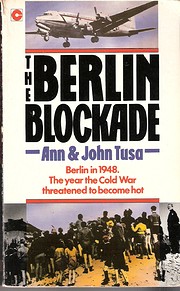

Klik op een omslag om naar Google Boeken te gaan.
|
Bezig met laden...
 Geen Bezig met laden...
Meld je aan bij LibraryThing om erachter te komen of je dit boek goed zult vinden. Op dit moment geen Discussie gesprekken over dit boek. To give the reader a complete understanding of how the Allied victors of WW II came to the impasse over Berlin during the years following the War, the authors give an amazing detailed description the fall of Berlin and immediate persecution of Berliners by the Russians. Then they do the same to show how the Western Allies found working with the Russians virtually impossible but did not have the armed forces available to challenge the Russians. The description of how the airlift started and how the Allies met the challenges of few air fields in Berlin to too few aircraft with the ability to carry the loads necessary to make the whole thing work is also very detailed. Equally detailed is the the long period of negotiation with the Soviets to allow Germany to govern itself and to include Berlin in that government. As we know final and complete unification did not take place until 1989 which this book does not cover as it was written before that occurred.. The men who ran the airlift never realized when it was over that they had "won a great victory and contributed to great changes in Europe". This a mammoth work of research. The notes cover 50 pages and the index 24. geen besprekingen | voeg een bespreking toe
In summer 1948, the Russians occupied all of Eastern Europe. Behind Russian lines, the Allied-controlled part of the great city of Berlin stood as the lone Western outpost in a sea of Communist occupation. Then the Soviets closed all Allied traffic through their zone, sealing off the food and supply routes on which the city relied. A vast air armada streamed from Western airfields to supply the hard-pressed Berliners with food and necessities. For over a year the Americans led a gigantic--and successful--effort to keep an entire city alive in the face of Soviet hostility. This is a story of individual heroism and high brinkmanship politics, of daily life under appalling circumstances and great achievements against all odds. Geen bibliotheekbeschrijvingen gevonden. |
Actuele discussiesGeenPopulaire omslagen
 Google Books — Bezig met laden... Google Books — Bezig met laden...GenresDewey Decimale Classificatie (DDC)943.1History and Geography Europe Germany and central Europe Northeastern GermanyLC-classificatieWaarderingGemiddelde: (3.5) (3.5)
Ben jij dit?Word een LibraryThing Auteur. |
||||||||||||||||||||||||||||||||||||||||||||||||||||||||||||||||||||||||||||||||||||||||||||||||||||||||||||||||||||||||
This was a great read, if sometimes containing a little too much technical detail about aeroplane parts and food processing and so on; and unfortunately there are absolutely no maps, diagrams or photos at all, which is a noteworthy omission. (